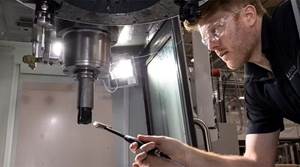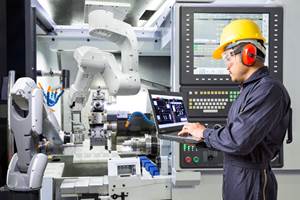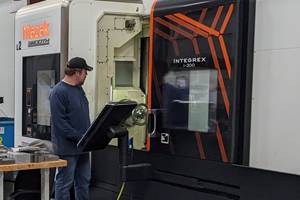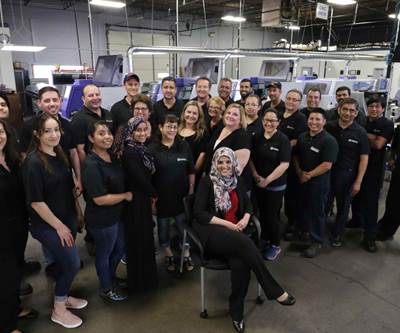ERP Software Gives Shop Control Over Scheduling
After relying on time cards for labor tracking and dealing with hot stickers on almost every job, Watson Grinding switched to Global Shop Solutions’ ERP software for automated tracking and intuitive scheduling.
Share







Takumi USA
Featured Content
View More

.png;maxWidth=45)
DMG MORI - Cincinnati
Featured Content
View MoreFor years, Watson Grinding and Manufacturing managed production with manual, paper-driven systems. “With our manual systems, we didn’t always know what was happening on the shop floor,” says Vice President Bob White. “As a result, labor costs, especially overtime, were out of control.” In order to sustain the company’s growth, management recognized the need for an integrated ERP system to manage its complex production processes. “We needed a system that provided better visibility of data, and Global Shop Solutions seemed like the best fit for us,” he says.
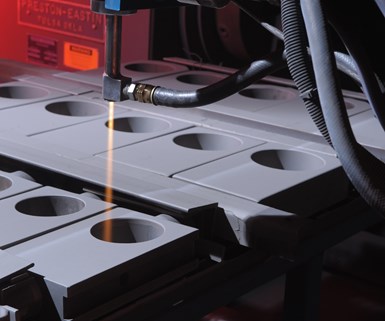
Watson Grinding and Manufacturing uses high-velocity oxygen fuel (HVOF) applications of tungsten carbide on some of its components to extend the service life of its valve products. While the company provides many different manufacturing and machining services, this remains Watson’s specialty.
Headquartered in Houston, the family-owned business specializes in carbide and ceramic thermal spray coatings and plasma thermal spray applications that extend the service life of parts in highly corrosive or wear-intensive environments. Watson Grinding’s sister company, Watson Valve Services, specializes in the custom design, repair and modification of severe-service metal-seated ball valves.
After installing Global Shop Solutions’ ERP system, Watson Grinding set about tackling one of its biggest shopfloor challenges: scheduling jobs more efficiently and predictably. Watson has hundreds of jobs moving through the shop floor at any given time, and being a true job shop, it rarely has two jobs that are exactly alike. With this complex production environment, the company needed a better way to schedule jobs and improve on-time delivery rates.
Taking Control of Labor and Job Scheduling
Before adopting Global Shop Solutions’ ERP software, Watson Grinding tracked all labor using manual time cards, which was a slow and tedious process. With the new platform, labor tracking is automatic. Workers use the graphical user interface (GUI) screens on the shop floor to scan in and out of jobs, and the software tracks the time and calculates labor costs for a particular job.

Before ERP software, Watson Grinding tracked all labor using manual time cards — a slow and tedious process. Since implementing ERP software from Global Shop Solutions, labor tracking is automatic.
“With the Advanced Planning and Scheduling (APS) module, we can easily schedule jobs in the right order and keep the workflow moving smoothly through the shop floor,” says Dave Dunn, controller for Watson Grinding. “We’re getting more work out on time, and the flexibility of the system is amazing. Instead of just sitting behind a PC in his office, our foreman can schedule jobs from anywhere on the shop floor by running Global Shop Solutions’ software directly on his tablet.”
Mr. Dunn says, “In the past, we didn’t have anything besides outside payroll reports. Now we get all the hours by department and by job. We also get a weekly report that shows how many hours every employee worked and in what areas. We use this at weekly management meetings to keep on top of labor costs.”
Mr. White adds that the company’s employees are still working a lot of overtime, “but that’s due to the amount of work we’re bringing into the shop, not because we don’t have a handle over scheduling and labor. With Global Shop Solutions, we know exactly when we’re working overtime, and more importantly, we know why.”
Customizing Applications
Watson Grinding’s IT Manager John Lichenstein considers the ability to create custom programs with its Global Application Builder (GAB) module to be one of Global Shop Solutions’ greatest assets.
The company’s first GAB project involved creating an external quality system that integrated with the ERP software. Quality control personnel could enter a work order, and the program automatically filled in the customer and job information. The program worked so well that Watson Grinding has rewritten it inside the software, saving even more time.
“With this program, we can easily identify the cost of quality for every job,” Mr. Lichenstein says. “All our ‘certs’ are in the program, as well as our inspection log, and all the documents are linked together. We can even tell if we’re waiting on someone to respond to an investigation.”

One of Watson Grinding’s strengths is a highly skilled workforce. Global Shop Solutions’s ERP software helps the company track labor costs and time spent on jobs so it can maximize its return on investment.
Simplifying the Entire Business
Prior to Global Shop Solutions, almost every job ticket had a “hot” sticker on it, meaning it had to be completed right away. Hot tickets are now a rare sight on the shop floor of Watson Grinidng. When new jobs come in, managers have a much better idea of when they can get them out, which has improved on-time deliveries, the company says.
Meanwhile, improved job costing enables Watson Grinding to estimate and quote new jobs more accurately. Salespeople have a much better understanding of what customers are buying, and the ERP software even helps with customer service.
“When customers call in with a problem, we use Global Shop Solutions to look up all the job information,” Mr. Dunn says. “If we can’t fix the problem right away, we can at least confirm what’s really going on and address the issue. Whether it’s in the shop, accounting or wherever, we can use the data to quickly fix problems with our customers and our vendors.”
Perhaps the software’s biggest benefit, Mr. Dunn says, is its ability to adapt to Watson Grinding’s unique shopfloor environment. “Because of the way the software is written, it easily adapts to how our company operates,” he says. “This software is easy to use. It provides all the reports you need to run your business. And most important, you can trust the data.”
Related Content
How this Job Shop Grew Capacity Without Expanding Footprint
This shop relies on digital solutions to grow their manufacturing business. With this approach, W.A. Pfeiffer has achieved seamless end-to-end connectivity, shorter lead times and increased throughput.
Read MoreHow to Mitigate Chatter to Boost Machining Rates
There are usually better solutions to chatter than just reducing the feed rate. Through vibration analysis, the chatter problem can be solved, enabling much higher metal removal rates, better quality and longer tool life.
Read More6 Machine Shop Essentials to Stay Competitive
If you want to streamline production and be competitive in the industry, you will need far more than a standard three-axis CNC mill or two-axis CNC lathe and a few measuring tools.
Read More5 Tips for Running a Profitable Aerospace Shop
Aerospace machining is a demanding and competitive sector of manufacturing, but this shop demonstrates five ways to find aerospace success.
Read MoreRead Next
Retain and Retrain, or Replace?
The answer to this questions is never completely up to the business owner; employees also have a say in it.
Read MoreBuilding Out a Foundation for Student Machinists
Autodesk and Haas have teamed up to produce an introductory course for students that covers the basics of CAD, CAM and CNC while providing them with a portfolio part.
Read More5 Rules of Thumb for Buying CNC Machine Tools
Use these tips to carefully plan your machine tool purchases and to avoid regretting your decision later.
Read More















.png;maxWidth=150)













.jpg;maxWidth=300;quality=90)

.jpg;maxWidth=300;quality=90)








